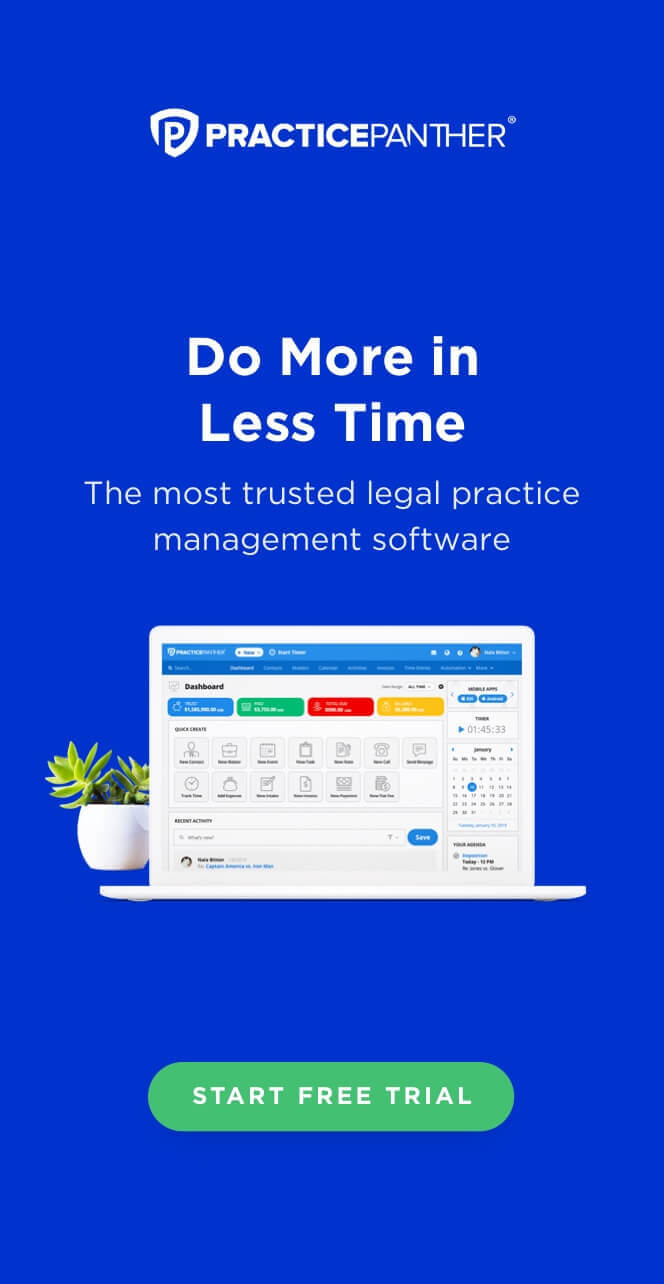Law firms leverage a spectrum of digital solutions to streamline their operations. From intricate case analysis with legal research platforms to seamless accounting with legal billing software, technology has become the unseen backbone of a successful practice. In fact, 77% of firms worldwide have reported increasing legal tech usage at their organization in the past few years.
This piece aims to explore the diverse digital tools essential for legal professionals, showcasing how these technologies and legal software examples collectively enhance the operational efficiency of a law firm.
What Software Does a Lawyer Use?
Lawyers today rely on a variety of software to maintain their competitive edge. Here’s a brief overview of the most commonly used software:
Case Management Software
Legal case management software serves as the operational hub for many law firms. It allows legal professionals to organize case files, track deadlines, and manage day-to-day tasks. High-quality case management software will also offer calendar integration, task assignment, and advanced reporting, all of which promote collaboration among team members and boost law firm growth.
Communication Tools
Are law firms using Slack for communication? Texting? Teams? Numerous communication tools exist, but the best option is communicating through practice management software. With this method, users can save various conversations to different clients and matters, ensuring the recording and organization of all conversations. Firms can also easily communicate with their clients if the practice management software has a client portal to exchange information and documents securely.
Document Management Software
With the bulk of legal work being document-intensive, legal document management software is indispensable. It allows for secure storage, quick retrieval, and easy sharing of documents. Robust search functionality is a hallmark of this software, enabling lawyers to find specific documents or reference materials in seconds. Version control is also crucial, ensuring everyone works on the latest document without losing prior edits.
Billing Software
Billing software automates invoicing, tracks billable hours and expenses, and manages client payments. It is often a part of case management software, providing a seamless transition from work performed to invoice generated. Modern billing software bolsters trust through transparent, customizable invoices that outline specific actions taken with only a few clicks of a button.
Legal Research Software
Lawyers use this software to navigate the vast ocean of legal precedent and statutory material. When initiating a research project, approximately 38% of attorneys typically start with well-known search engines, and 37% prefer using paid online legal databases, illustrating the reduced reliance on printed materials, which only 4% of lawyers now use as a starting point. Legal research software boasts powerful search features, annotation capabilities, and collaborative functions, seamlessly connecting lawyers with the precise information they need for their cases.

What Is the Best Legal Office Management Software?
Identifying the best legal office management software involves looking for key features like the following:
- User-Friendly Interface: Reduces training time and enhances productivity.
- Robust Security Features: Protects sensitive client information.
- Comprehensive Case Management: Manages all case-related information in one place.
- Native ePayments: Makes it easy for clients to pay their invoices.
- Seamless Billing: Offers efficient time tracking and invoicing.
- eSignature Capabilities: Reduces the signing process to mere minutes.
- Effective Client Communication Tools: Enhances client engagement with secure portals.
- Document Handling: Organizes documents with their corresponding matters.
PracticePanther stands out by ticking all these boxes, making it an ideal choice for efficient legal office management. Sign up for a free demo to experience its capabilities firsthand.
What Is CRM for Law Firms?
CRM software for law firms focuses on client relationship management, a fundamental aspect for any law firm looking to grow and maintain a strong client base. CRM systems help attorneys track interactions with current and potential clients. These features are essential in a field where timely and personalized communication can significantly impact client satisfaction and retention.
A well-designed CRM tool will assist with the following:
- Automated Intake Forms: Client intake and CRM software go hand in hand, and automated intake forms are a must-have feature. This feature ensures that client data is accurately and efficiently transferred to your CRM, reducing manual data entry and enhancing the accuracy of client information.
- Custom Tags and Workflows: Custom software tags make organizing client information more manageable. Firms can categorize contacts as clients, prospects, or professional contacts and even filter these tags for business insights. Automated workflows enable the creation of triggered tasks and events, improving client interaction and ensuring no one misses critical deadlines or appointments.
- Intuitive Dashboard: You’ll want an intuitive dashboard that offers a comprehensive view of case statuses, including contact and matter details, account balances, and payment information. This centralized view aids in better case management and client service.
- Client Communication and Reminders: Look for CRM software that automates the scheduling process, including sending automatic meeting reminders via email, SMS text, or through the client portal. This feature ensures effective engagement with clients at various touchpoints.
The ability to blend CRM with existing practice management software is beneficial for law firms. Lawyers can access everything from case documents to client communication histories in a single system, which reduces the risk of errors likely to occur when flipping between different platforms.
In this context, PracticePanther stands out as the all-in-one legal software solution. It not only manages cases and workflows but also incorporates various CRM features. By providing a unified solution, PracticePanther simplifies technology for legal professionals, allowing them to give more energy to their clients and less to managing multiple software systems.

What Accounting Software Do Law Firms Use?
Law firms use specialized accounting software to handle legal-specific financial needs like trust accounting, billing, and expense tracking. With accurate accounting, law firms can maintain financial compliance and keep a pulse on their financial health.
Efficient law firm accounting software should also automate time-consuming tasks like invoicing, expense tracking, and financial reporting. This automation saves valuable time, allowing lawyers to focus on client cases rather than financial administration. Moreover, it helps in forecasting and budgeting, which is essential for strategic planning and growth.
For law firms, an integrated approach to software solutions is the best choice. While standalone accounting programs exist, law practice management software with accounting features offers a more streamlined experience. These integrated solutions reduce the need for multiple software platforms, simplifying workflows and minimizing the risk of data entry errors.
Consolidate Your Law Firm Software with PracticePanther
PracticePanther is the all-in-one legal software on the market, taking your law firm from the chaos of multiple systems to a unified solution. With PracticePanther, law firms can manage their cases, communications, documents, and finances in one centralized platform, leading to more organized and effective practice management.
Book a complimentary demo today to explore the full potential of PracticePanther and what it can do for your law office.





